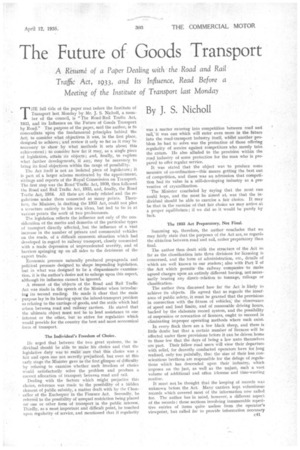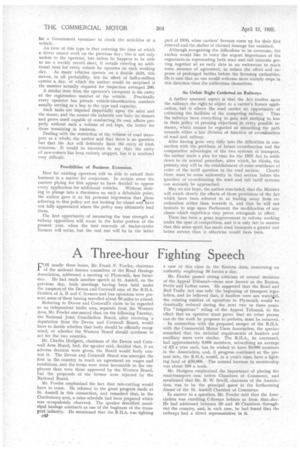The Future of Goods Transport
Page 63

Page 64

If you've noticed an error in this article please click here to report it so we can fix it.
By J. S Nichol'
THE full title of the paper read before the Institute of Transport last Monday by Mr. J. S. Nicholl, a member of the council, is "The Road-Rail Traffic Act, 1933, and its Influence on the Future of Goods Transport by Road." The purpose of the paper, said the author, is to concentrate upon the fundamental principles behind the Act; to consider what objectives it was, in the first place, designed to achieve; and review it only so far as it may be necessary to show by what methods it sets about this achievement ; to consider how far it may, as a single piece of legislation, attain: its objects ; and, finally, to explore what further developments, if any, may be necessary to bring its final objectives within the range of possibility.'
The Act itself is not an isolated piece of legislature; it is part of a larger scheme motivated by the appointment, sittings and reports of the Royal Otimmission on Transport. The first step was the RoacrTraffic Act, 1930, then followed the Road and Rail Traffic Act, 1933, and, finally, the Road Traffic Act, 1934. All these arc closely related and the regulations under them connected at many points. Therefore, the Minister, in drafting the 1933 Act, could not plan a structure entirely to his own ideas, but had to tie in at various points the work of two predecessors.
The legislation reflects the influence not only of the con. sideration of the merits and demerits of the particular types of transport directly affected, but the influence of a vast increase in the number of private and commercial vehicles on the roads, of a difficult economic situation which had developed in regard to railway transport, closely connected with a trade depression of unprecedented severity, and of barriers springing up on all sides to the detriment of the export trade.
Economic pressure naturally produced propaganda and political pressure designed to shape impending legislation, but in what was designed to be a dispassionate examination, it is the author's desire not to enlarge upon this aspect, although its influence cannot be ignored.
• A résumé of the objects of the Road and Rail Traffic Act was Made in the speech of the Minister when introducing its second reading. He made it clear that the main purpose lay in its bearing upon the inland-transport problem as relating to the carriage of goods, and the strife which had arisen between road and railway carriers. He stated that the ultimate object must not be to lend assistance to one interest or the other, but to strive for regulation which would provide for the country the best and most economical form of transport.
The Individual's Freedom of Choke.
He urged that between the two great systems, the in dividual should be able to make his choice and that the legislative duty was to make sure that this choice was a fair and open one not secretly prejudiced, but even at this early stage the Minister gave us the first glimpse of difficulty by refusing to examine whether such freedom of choice would satisfactorily solve the problem and produce a correct allocation of transport between road and rail.
Dealing with the factors which might prejudice this choice, reference was made to the possibility of a hidden element of public subsidy, a matter dealt with by the Chancellor of the Exchequer in the Finance Act. Secondly, he referred to the possibility of unequal restriction being placed me one or other form of transport in the public interest. Thirdly, as a most important and difficult point, he touched upon regularity of service, and mentioned that if regularity
was a matter entering Into competition between road and rail,sit was one which will enter even more in the future into the road-transport industry itself, whilst another -problem he had to solve was the protection of those offering regularity of service against competitors who merely take the cream. He also alluded to the provision within the road industry of some protection for the man who is prepared to offer regular service.
It was stated that the object was to produce some measure of co-ordination--this means getting the best out of competition, and there was an admission that competition had its value in a still-developing industry as a preventive of crystallization.
The Minister concluded by saying that the most one could hope, and the most he aimed at, was that the individual should be able to exercise a fair choice. It may be that in the exercise of that fair choice we may arrive at a proper equilibrium ; if we did so it would be purely by luck.
The 1933 Act Preparatory, Not Final.
Summing up, therefore, the author concludes that we may fairly state that the purposes of the Act are, as regards the satiation between road and rail, rather preparatory than final.
The author then dealt with the structure of the Act so far as the classification into three divisions for licensing is concerned, and the form of administration, etc., details of which are well known to our readers; also with Part 2 of the Act which permits the railway companies to snake agreed charges upon an entirely different fooling, not necessarily bearing any direct-relation to tonnage, mileage or classification.
The author then discussed how far the Act is likely to achieve its objects. He agreed that as regards the insurance of public safety, it must be granted that the provisions in connection with the fitness of vehicles; the observance of speed and load limits, and of reasonable driving hours, backed by the elaborate record system, and the possibility of suspension or revocation of licences, ought to succeed in eliminating improper operating methods where such exist.
In every flock there are a few black sheep, and there is little doubt but that a certain number of licences will be affected under these provisions before it can be driven home to those few that the days of being a law unto themselves are past. Their fellow road users will view their departure with relief, for decently conducted operators have for long realized, only too painfully, that the sins of their less conscientious brethren are responsible for the deluge of regulations which has descended upon their industry, which imposes on the just, as well as the unjust, such a vast volume of additional and often irksome and time-wasting routine.
It must not be thought that the keeping of records was unknown before the Act. Many carriers kept voluminous records which covered most of the information now called for. The author has in mind, however, a different aspect of the records:' those sections involving innumerable repetitive entries of Heins quite useless from the operator's viewpoint, but called for to provide information necessary for a Government examiner to check the activities of a vehicle.
An item of this type is that coVering the time at which a driver ceased work on the previous day; this is not only useless to the operator, but unless he happens to be able to use a weekly record sheet, it entails entering an additional item for every vehicle he operates on each working day. As many vehicles operate on a double shift, this means, in all probability, not far short of half-a-million entries a day, of which the author would be surprised if the number actually required for inspection averaged 200.
A similar item from the operator's viewpoint is the entry
of the registration number of the vehicle. Practically every operator has private vehicle-identification numbers usually serving as a key to the type and capacity. Such tasks are imposed' impartially upon. the saint and the sinner, and the sooner the industry can•bury its sinners and prove itself capable of conducting its own affairs properly without such a volume of red tape, the better for
those remaining in business. . . • . .
Dealing with the restriction" of the volume of road transport as a whole, the author said that there is no question but that the Act will definitely limit the entry of fresh concerns. It would be incorrect to say that the entry of new-comers has been entirely stopped, but it is rendered very difficult.
Possibilities of Business Extension.
How far existing operators will be able to extend their business is a matter for conjecture. In certain areas the carriers plying for hire appear to have decided to oppose
every application for additional vehicles. Without desiring to plunge into a discussion on such a debatable point, the author gave it as his personal impression that ithose adhering to this policy are not looking far ahead and have not fully appreciated where the policy may ultimately lead them.
The first opportunity of measuring the true strength of railway opposition will occur in the latter portion of the present year, when the first renewals of trader-carrier licences will occur, but the real test will be in the latter part of 1936, when carriers' licences come up for their first renewal and the shelter of claimed tonnage has vanished.
Although recognizing the difficulties to be overcome, the author would like to voicethe urgent importance of the organizations representing both road and rail interests getting together at an early date in an endeavour to reach some measure of agreement, to reduce the effort and expense of prolonged battles before the licensing authorities. I-le is sure that no one would welcome more warmly steps in this direction than the authorities themselves.
An Unfair Right Conferred on Railways.
A further unsound aspect is that the Act confers upon the railways the right to object to a carrier's licence application, but it allows the road carrier no opportunity of
criticizing the facilities of the competing railway. Thus the railways have everything to gain and nothing to lose in their policy of pressing objections in every possible instance, which cannot be regarded as smoothing the path towards either afair division of function Or co-ordination of road and railway.
After having gone very fully into the difficulties in connection with the problems of future co-ordination and the comparative advantages of the two systems of 'transport, the author made a plea for time for the 1933 Act to settle down to its normal procedure, after which, he thinks, the primary step will be the establishment of some semblance of order of the tariff question in the road section. Clearly there must be some uniformity in that section before the question of co-ordinating the road and rail tariff systems can seriously be approached.
May we not hope, the author concluded, that the Minister will watch closely the effects of those provisions of the Act which have been referred to a.P. leading away from coordination rather than towards it, and that he will not hesitate to urge upon Parliament the modification of any clause which experienze may prove retrograde in effect. There has been a great improvement in railway working under the spur of competition, and it is only fair-to assume that this same spirit has made road transport a greater and better service than it otherwise would have been.












































































































